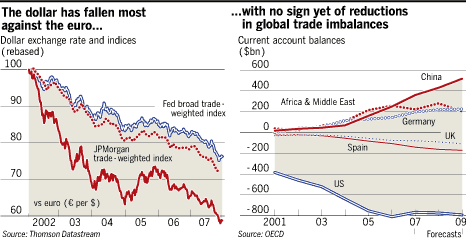How do we get out of this scenario alive?
Rolf Englund
FT 4/10 2005
Rolf Englund 2001
"Shop until the exchange rate of the dollar drop"
News Home
Home - Index - News - Krisen 1992 - EMU - Economics - Cataclysm - Wall Street Bubbles - US Dollar - Houseprices
The dollar must fall, almost everyone said. Five years ago
How to solve the problem of the dollar
The world economy faces an acute policy dilemma that, if mishandled, could bring on the mother of all monetary crises.
Fred Bergsten, FT December 10 2007
Many dollar holders, including central banks and sovereign wealth funds as well as private investors, clearly want to diversify into other currencies. Since foreign dollar holdings total at least $20,000bn, even a modest realisation of these desires could produce a free fall of the US currency and huge disruptions to markets and the world economy. Fears of such an outcome have risen sharply in both official circles and the markets.
However, none of the countries into whose currencies the diversification would take place want to receive these inflows. The eurozone, the UK, Canada and Australia among others believe that their exchange rates are already substantially overvalued.
There is only one solution to this dilemma that would satisfy all parties: creation of a substitution account at the International Monetary Fund through which unwanted dollars could be converted into special drawing rights, the international money created initially by the fund in 1969 and of which $34bn-worth now exists. Such an account was worked out in great detail in 1978-1980 during an earlier bout of currency diversification and free fall of the dollar that closely resembled today’s circumstances.
Why the dollar’s drop is failing to rebalance the world
Chris Giles, FT December 10 2007
Since February 2002 the dollar has indeed fallen, by 28 per cent against the currencies of America’s trading partners after adjusting for inflation. But those expecting a warm glow of happiness in international currency discussions find themselves sorely disappointed.
The much greater, 41 per cent decline against the euro has strained the usual diplomacy of Jean-Claude Trichet

The growing evidence that the dollar’s decline will not be followed by a narrowing of global imbalances, merely a shifting of them around the world, gives cause for real concern.
Still, the exchange rate shift is having its usual effect. US exports have become cheaper and, after quite a lag, are growing rapidly. The US current account deficit is this year projected to fall for the first time since the recession of 2001.
Quite simply, the random walk theory predicts that tomorrow’s exchange rate will be the same as today’s, with some random movement up or down. The superiority of the random walk over other forecasting techniques was laid out in a seminal 1983 paper by economists Richard Meese and Kenneth Rogoff. For years, the brightest minds in statistics have been unable to beat the accuracy of that model.
Interesting times ahead for all
Rolf Englund, Letters to the Editor,
Financial Times, November 6, 2000